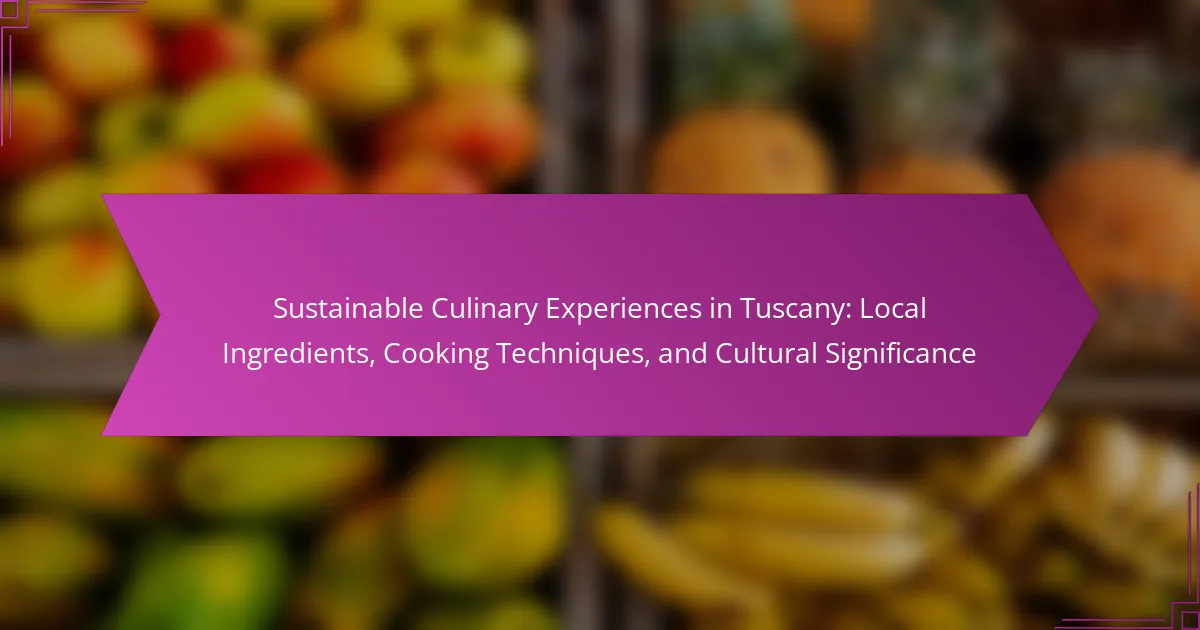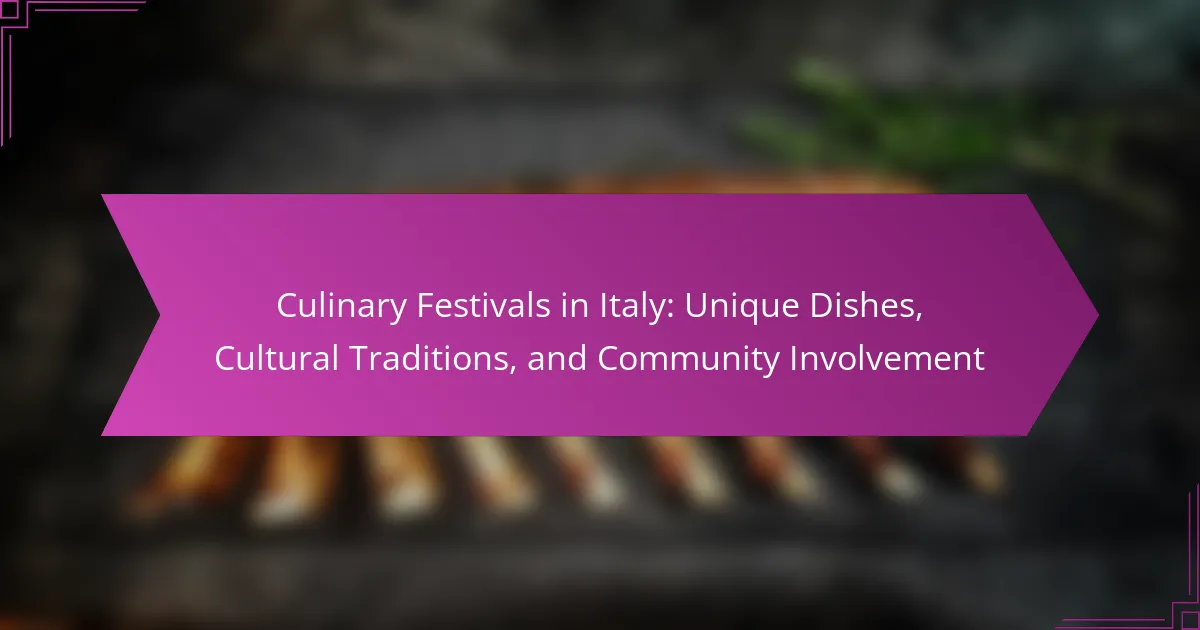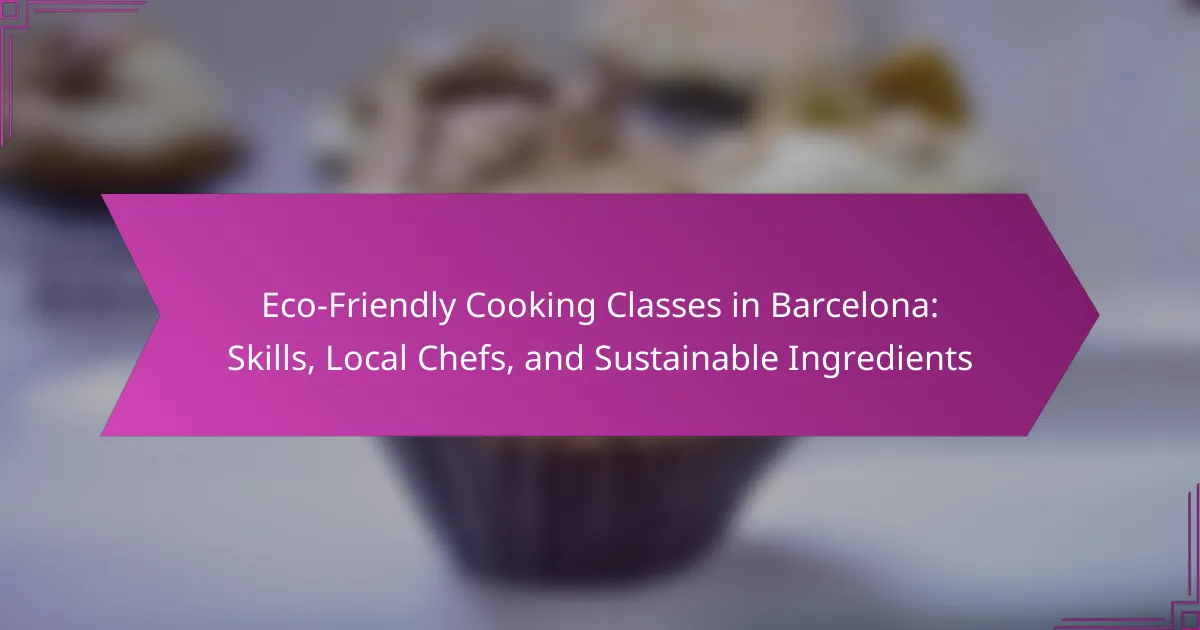Explore the rich world of organic wine tours in Bordeaux, where sustainable practices enhance wine quality. Discover key eco-friendly methods used in local vineyards, participate in immersive tasting events, and learn about the unique terroir that influences flavor. Engage with passionate winemakers and deepen your appreciation for organic viticulture through personalized experiences.
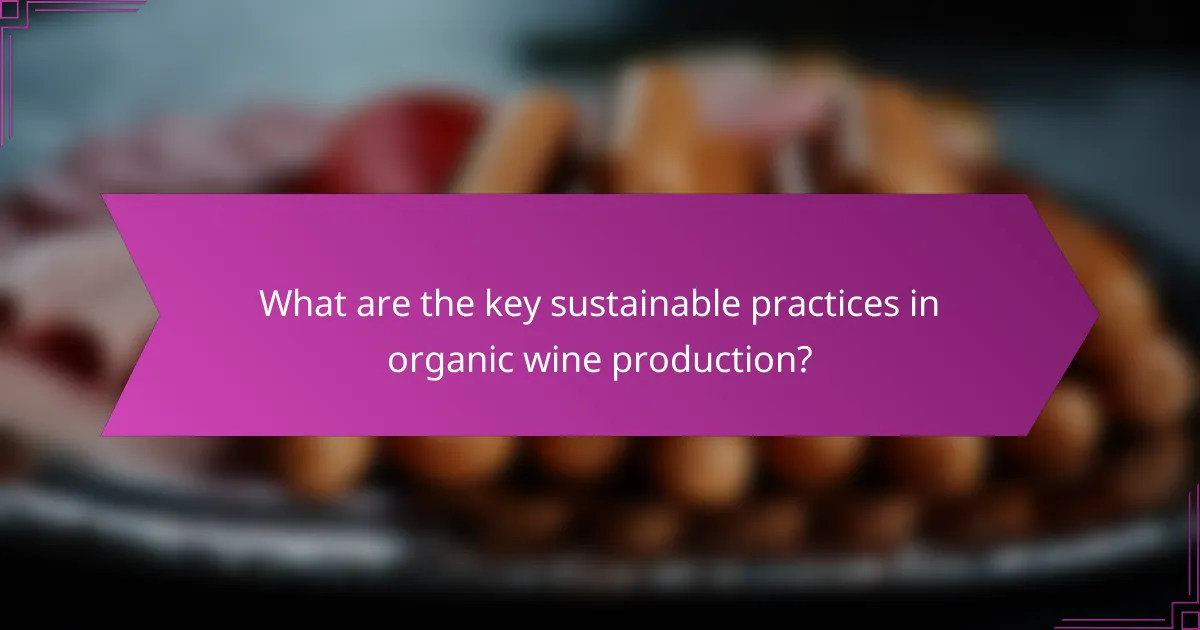
What are the key sustainable practices in organic wine production?
Key sustainable practices in organic wine production include minimal intervention, biodiversity promotion, and soil health enhancement. These practices ensure environmentally friendly cultivation while maintaining high-quality grapes. Organic vineyards often utilize cover crops, compost, and natural pest control methods to promote ecological balance. Additionally, many wineries in Bordeaux engage in water conservation and energy-efficient processes, supporting a sustainable future in wine production.
How do organic vineyards maintain soil health?
Organic vineyards maintain soil health through practices like cover cropping, composting, and crop rotation. These methods enhance soil structure, increase biodiversity, and promote nutrient cycling. For instance, cover crops prevent erosion and improve organic matter, while compost enriches soil with essential nutrients. Additionally, organic farmers avoid synthetic chemicals, fostering a natural ecosystem that supports beneficial microorganisms. This holistic approach not only sustains soil health but also contributes to the overall quality of organic wine produced in Bordeaux.
Why is biodiversity important in organic wine regions?
Biodiversity is crucial in organic wine regions as it enhances ecosystem health and wine quality. A diverse range of plants and animals supports natural pest control, reduces disease, and promotes soil fertility. This leads to healthier vines and better grape quality, which is essential for premium organic wines. Additionally, biodiversity contributes to the resilience of vineyards against climate change, ensuring sustainable practices in regions like Bordeaux.
Which certifications ensure organic practices in Bordeaux?
Certifications that ensure organic practices in Bordeaux include Ecocert, AB (Agriculture Biologique), and Demeter. These certifications verify adherence to organic farming standards, promoting sustainable practices in local vineyards. Ecocert focuses on environmental conservation, AB guarantees organic methods, and Demeter emphasizes biodynamic principles.
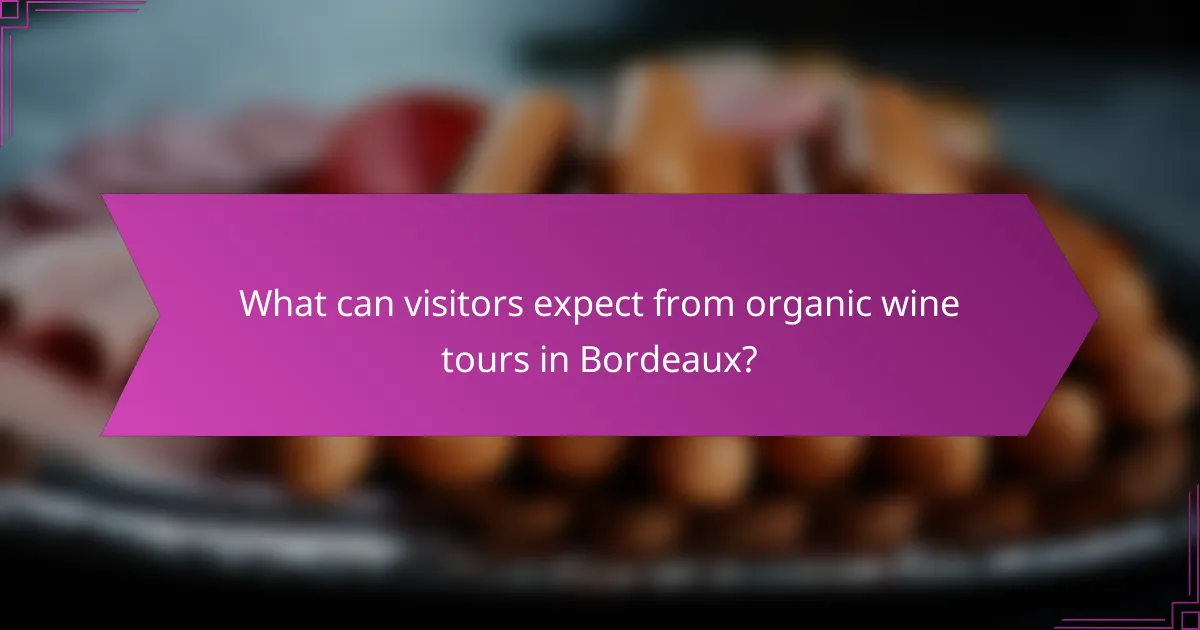
What can visitors expect from organic wine tours in Bordeaux?
Visitors can expect immersive experiences that highlight sustainable practices in organic wine production during tours in Bordeaux. These tours often include visits to local vineyards that prioritize eco-friendly methods, such as using organic fertilizers and natural pest control. Tasting events showcase a variety of wines, allowing visitors to appreciate the unique flavors resulting from organic farming techniques. Additionally, participants may engage in educational sessions about the benefits of organic viticulture, enhancing their understanding of sustainable wine production.
How are tasting events structured in organic vineyards?
Tasting events in organic vineyards are structured to emphasize sustainability and the unique flavors of organic wines. Typically, these events begin with a guided vineyard tour, where guests learn about organic farming practices and grape varieties. Participants then engage in a structured tasting session featuring a selection of wines paired with local produce. Each wine is presented with details on its organic attributes, enhancing the tasting experience. This format not only showcases the wine but also educates attendees on the environmental benefits of organic viticulture.
What unique experiences do local vineyards offer during tours?
Local vineyards offer immersive experiences during tours, focusing on organic wine production. Visitors can participate in hands-on activities like grape harvesting and learn about sustainable practices. Tasting events feature exclusive wines, often paired with local cuisine, enhancing the overall experience. Additionally, some vineyards provide guided tours through their vineyards, showcasing unique varietals and the terroir’s influence on flavor.
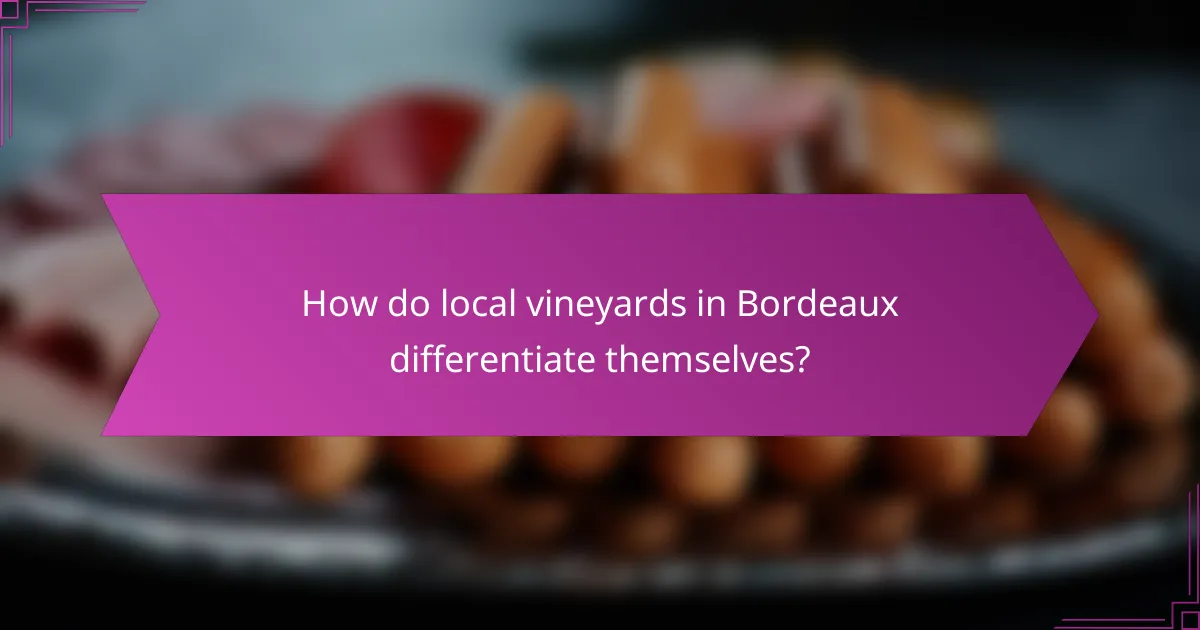
How do local vineyards in Bordeaux differentiate themselves?
Local vineyards in Bordeaux differentiate themselves through sustainable practices, unique tasting events, and organic wine production. Many focus on eco-friendly farming methods, such as biodynamic agriculture, which enhances soil health and biodiversity. They often host exclusive tasting events that showcase their organic wines, allowing visitors to experience the distinct flavors that arise from sustainable cultivation. Additionally, some vineyards offer personalized tours that educate guests about their unique approaches to winemaking, fostering a deeper appreciation for organic wines. These strategies not only attract environmentally conscious consumers but also enhance the overall wine tourism experience in Bordeaux.
Which rare grape varieties are cultivated in organic vineyards?
Rare grape varieties cultivated in organic vineyards include Petit Verdot, Tannat, and Carmenère. These varieties thrive in Bordeaux’s unique terroir, enhancing the region’s sustainable wine production. Organic practices promote biodiversity and soil health, contributing to the distinct flavors and qualities of these grapes.
What innovative techniques are used by select vineyards?
Innovative techniques used by select vineyards include biodynamic farming, precision viticulture, and natural fermentation. These methods enhance sustainability and improve wine quality. Biodynamic farming utilizes holistic practices, promoting biodiversity and soil health. Precision viticulture leverages technology, such as drones and sensors, to monitor vine health and optimize resource use. Natural fermentation relies on wild yeast, creating unique flavor profiles and reducing chemical additives. These practices reflect a commitment to environmental stewardship while delivering exceptional wines.
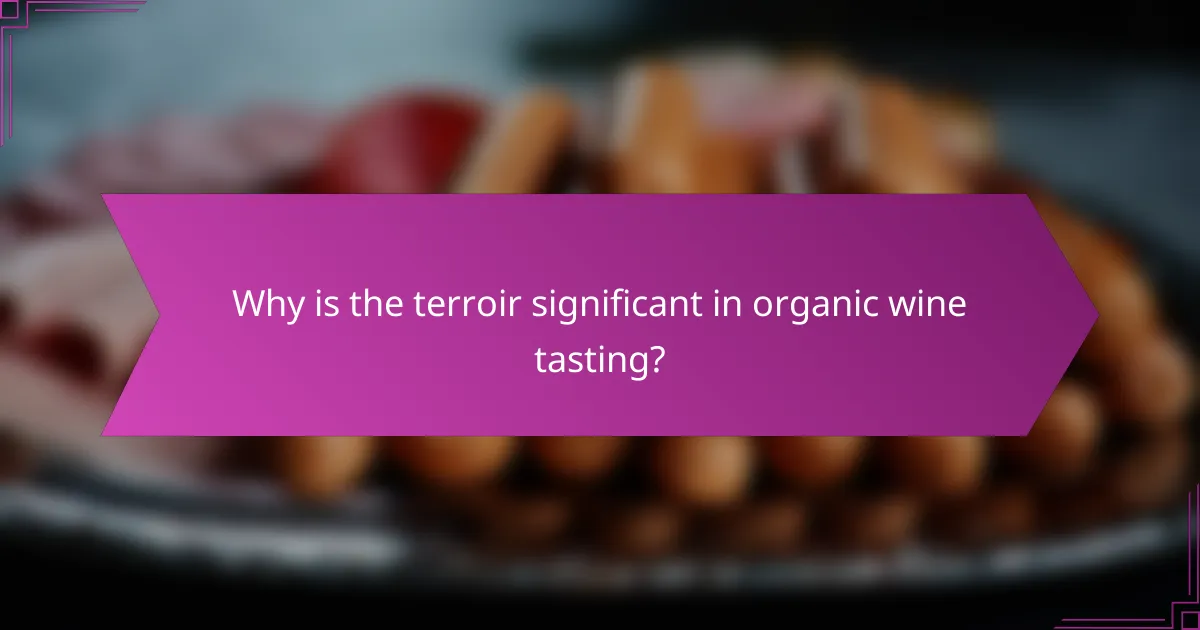
Why is the terroir significant in organic wine tasting?
Terroir is significant in organic wine tasting because it influences the flavor profile and quality of the wine. Terroir encompasses the unique combination of soil, climate, and vineyard practices that shape the grapes. In Bordeaux, where organic wine tours highlight sustainable practices, understanding terroir enhances the tasting experience. Visitors learn how local conditions affect the characteristics of organic wines, making each tasting event a reflection of the region’s distinct environment. This connection between terroir and flavor not only enriches the tasting experience but also promotes appreciation for sustainable viticulture.
How does climate influence the flavor profiles of organic wines?
Climate significantly influences the flavor profiles of organic wines by affecting grape growth and maturation. Variations in temperature, rainfall, and sunlight shape the characteristics of the grapes. For instance, warmer climates typically produce riper grapes with higher sugar levels, leading to fuller-bodied wines. Conversely, cooler climates result in grapes with higher acidity and more delicate flavors. Bordeaux’s diverse climate allows for a range of organic wine styles, enhancing the tasting experience during tours. Sustainable practices in local vineyards further contribute to the unique flavor profiles, showcasing the importance of terroir in organic wine production.
What role do traditional winemaking methods play in organic production?
Traditional winemaking methods significantly enhance organic production by emphasizing sustainability and biodiversity. These methods often involve minimal intervention, allowing natural fermentation and using organic grapes without synthetic chemicals. As a result, traditional techniques promote healthier ecosystems in vineyards, leading to richer flavors and authentic expressions of terroir. Organic wine tours in Bordeaux highlight these practices, showcasing local vineyards committed to preserving heritage while producing high-quality wines.
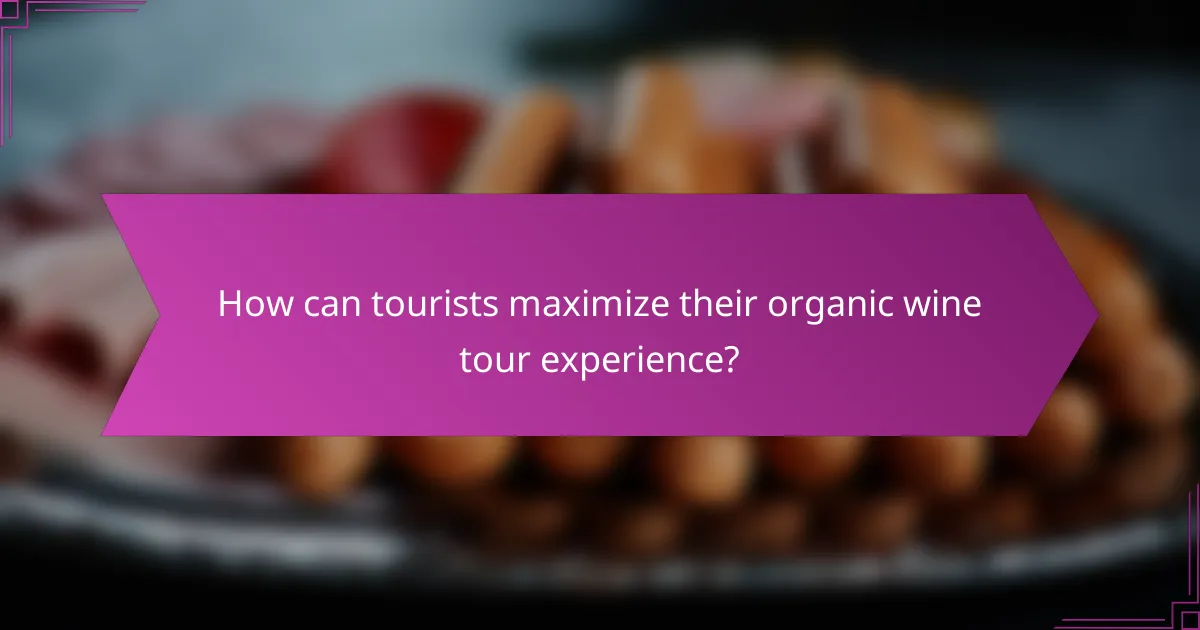
How can tourists maximize their organic wine tour experience?
Tourists can maximize their organic wine tour experience by engaging with local vineyards, participating in tasting events, and understanding sustainable practices. Visiting smaller, family-owned wineries often provides a more personalized experience. Tourists should inquire about the vineyard’s organic certification and the specific methods used in their wine production. Attending seasonal events can enhance the experience, offering unique tastings and insights into the local terroir. Additionally, tourists should consider booking guided tours that focus on the environmental benefits of organic viticulture, which can deepen their appreciation for the wines they sample.
What are the best practices for engaging with local winemakers?
Engaging with local winemakers involves building genuine relationships and understanding their practices. Attend organic wine tours in Bordeaux to experience sustainable winemaking firsthand. Participate in tasting events to connect directly with winemakers and learn about their unique attributes, such as vineyard management and grape selection. Supporting local vineyards fosters community ties and promotes sustainable practices in the wine industry.
What common mistakes should visitors avoid during tastings?
To enhance your experience at organic wine tastings, avoid common mistakes such as rushing through the tasting, neglecting to ask questions, and overlooking the importance of palate cleansing. Engage with the staff for insights on sustainable practices and local vineyards. Take time to savor each wine, as this helps appreciate the unique attributes of organic wines, such as their lower sulfite levels and distinctive flavors. Remember to pace yourself and enjoy the full experience of Bordeaux’s rich wine culture.
Which resources can enhance understanding of organic wines?
Organic wine tours in Bordeaux can be enhanced by local vineyard visits, tasting events, and educational workshops. These resources provide insight into sustainable practices and organic viticulture. Engaging with winemakers offers firsthand knowledge of their techniques and philosophies. Additionally, guided tours often include tastings of unique organic wines, showcasing their distinct flavors and attributes.
